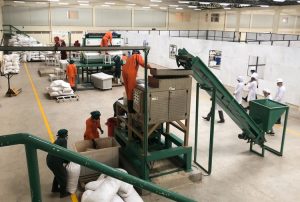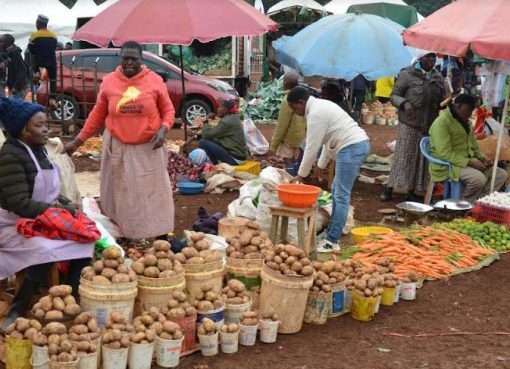A total of 13000 Macadamia farmers in East Africa are set to benefit from the Sh1.2 billion to spur its production.
The farmers are projected to reap huge benefits following an investment of US$ 8.5 million (Sh 1,237,607,320.53 billion) to accelerate sustainable production of the crop in Kenya and Tanzania.
A leading Kenyan-based Company Pamoja, is targeting 6,200 hectares of managed land according to stringent sustainability criteria (Organic and Fair Trade) to support 13,000 small local producers by 2031.

Guillaume Maillard, Founder and Managing Director of Pamoja, said the company is strengthening its position in the high-end segment of its market thanks to a dedicated sustainable investment by French Asset Management Company, Mirova.
“This partnership with Mirova will enable us to step up our efforts by promoting sustainable and profitable exploitation of arable land by train producers in best Agricultural practices,” Maillard said.
He said they will also be able to strengthen industrial facilities, managed according to our Swiss standards, which enable nuts processed in Kenya to compete with those from other countries,” Maillard emphasised in a press release issued Monday.
Through its East African subsidiaries TenSenses and Macjaro, he said, the firm boasts of currently working with nearly 6,000 small-scale producers with a constant focus on improving agricultural practices and gaining access to international standards.
Significantly, Pamoja’s Athi-River processing plant provides access to extensive distribution networks, which will continue to generate substantial additional income for the producers, allowing them to access international markets.
According to the Nuts Traders Association of Kenya, Macadamia growers from Mt. Kenya and parts of the Rift Valley regions earned Sh4.1 billion in 2022.
The various licensed processors were able to handle a capacity of 80,000 tonnes. Globally, Kenya is ranked as the third largest producer of macadamia, with a market share of 13 per cent (7,750 tonnes) on a kernel basis.
In the last decade (2009–2018), Kenya’s macadamia production experienced an upward trajectory from around 11,000 tonnes of nut-in-shell (NIS) to 42,500 tonnes.
As one of the most lucrative cash crops after tea, macadamia’s price has soared between Sh100 and Sh130 per kilogramme compared to Sh30 last year.
This has been attributed to the Kenyan government’s suspension of Section 43 of the Agriculture and Food Authority (AFA) Act in November 2023, which outlawed in-shell exportation.
Maillard pointed out that the firm also intends to extend its support programme for small-scale producers to establish a sustainable value chain, along the lines of what has been set up in Kenya.
Its inclusion efforts cover a programme for small-scale farmers, which is geared towards reducing poverty and inequality.
“We are highly committed to positively impacting the planet and people’s lives through sustainable agriculture, knowledge sharing, and offering new opportunities,” he explained.
Maillard added that their focus is sustainable agriculture, which aims to efficiently use natural resources by ensuring fair economic returns throughout the value chain.
The noble partnership, co-promoted by the United Nations Convention to Combat Desertification (UNCCD) and Mirova, is part of the Land Degradation Neutrality1 (LDN) fund, aimed at financing projects that contribute to land degradation neutrality.
The huge investment makes Pamoja join a portfolio of 12 sustainable land management projects in Africa, Latin America, and Asia in supply chains as diverse as coffee, cocoa, wood, nuts, and fresh fruits.
It also covers ingredients for the pharmaceutical industry and payments for ecosystem services, which demonstrates the effectiveness of the sustainable business model promoted by Mirova.
On the same mission through Macjaro in Tanzania, the company is developing macadamia nut farms, operated with respect for agroforestry ecosystems.
It’s projected to plant over 700 hectares of new coffee and macadamia nut farms over the next few years.
According to Gautier Quéru, the Managing Director at Mirova, the significant investment in Pamoja illustrates their ongoing commitment to sustainable land management in emerging countries.
With Mirova’s expertise, local presence, and long-term financial support, Quéru, stated that Pamoja is now better equipped to develop its strategy around sustainable land management.
“This is in line with our objective of supporting sustainable transition in the agricultural and forestry sectors while generating long-term financial value for our investors,” he declared.
By Rolex Omondi and Joseph Ouma





